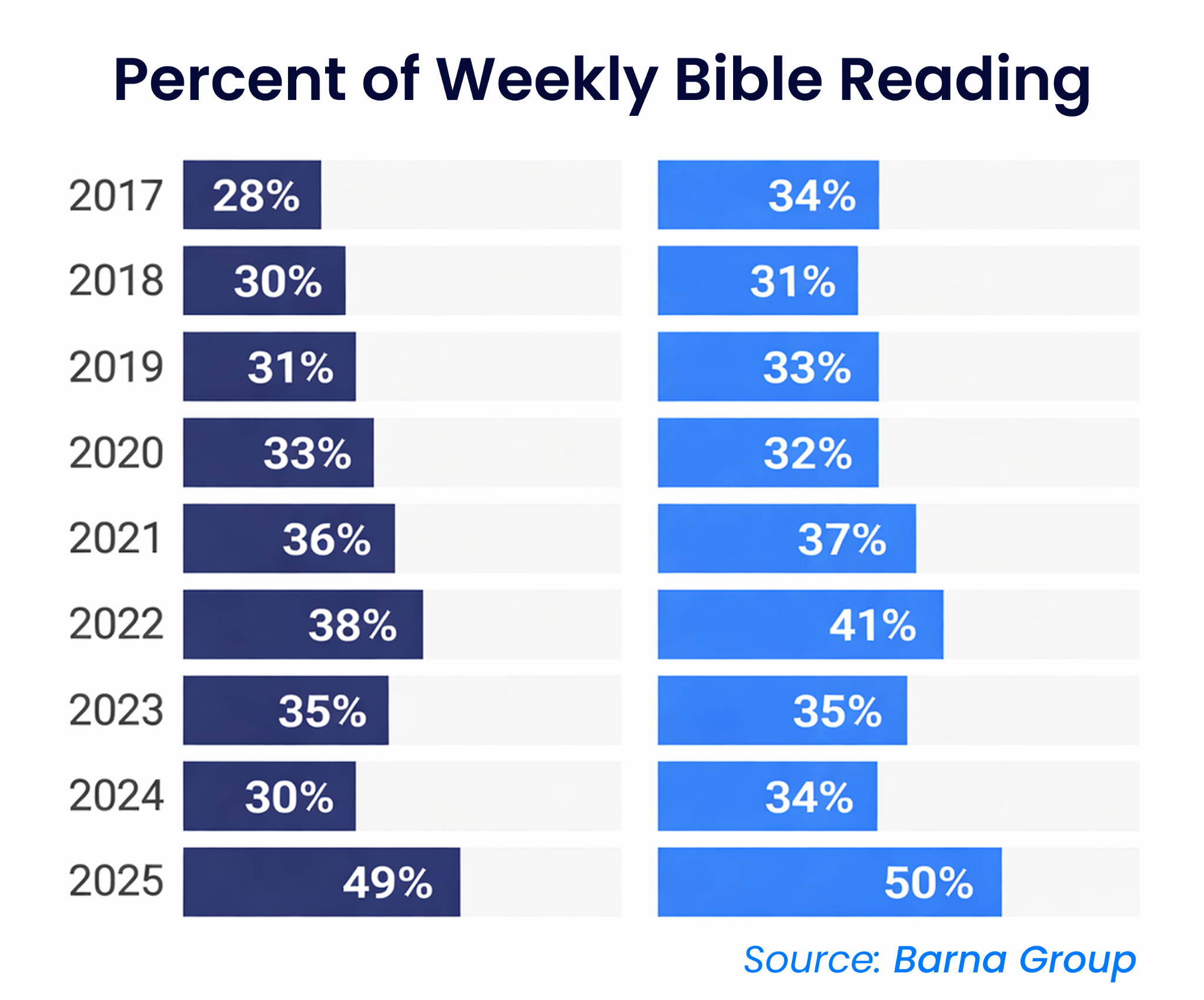You’ve heard the whispers of revival or at least a shift happening. A step toward faith. People waking up to faith in unexpected places — even Joe Rogan and Russel Brand¹ are talking about God. According to Ed Stezer, a “quiet revival” is already happening — outside the walls of church, in podcasts, music, and surprising testimonies. The signs aren’t loud, but they’re real — and they’re growing. The question isn’t if God is stirring hearts. It’s whether your church is prepared to meet them when they show up.

By Sarah Nashif-Tan, VisitorReach
You’ve heard the whispers of revival or at least a shift happening. A step toward faith. People waking up to faith in unexpected places — even Joe Rogan and Russel Brand¹ are talking about God.
According to Ed Stezer, a “quiet revival” is already happening — outside the walls of church, in podcasts, music, and surprising testimonies. The signs aren’t loud, but they’re real — and they’re growing.
And it’s not just cultural signals. Bible reading in America is surging again. Today, 42% of adults nationwide read Scripture weekly!²
The question isn’t if God is stirring hearts. It’s whether your church is prepared to meet them when they show up.
This article is for pastors and church leaders who don’t want to miss the moment. We’ll show you the signs of what’s unfolding, why many churches will miss it, and how yours can respond — not just with open doors, but with actual paths for real spiritual growth.
If you’re paying attention - Revival isn’t just wishful thinking — it’s already showing signs of life. Not through stadium events or viral worship nights, but quietly, flicker awakenings are happening.

Joe Rogan, one of the most influential media voices in America, recently confirmed he’s attending a non-denominational church.³ That may not sound radical — but for someone with Rogan’s audience, it signals a shift. Faith is becoming speakable again in places it once wasn’t.

Christian bookstores⁴ are seeing young people walking into bookstores saying, “I want a Bible. All my friends are reading this thing.”
And the data backs it up. According to Barna, Bible engagement among Gen Z and Millennials jumped nearly 20% in 2025 — one of the largest year-over-year surges Barna has ever recorded.²
Also, the American Bible Society reported an uptick in Bible engagement across the country⁴ — especially among Millennials.
These aren’t just one-off anecdotes. They’re part of a broader movement of people asking bigger questions and seeking something deeper.
A recent USA Today piece called this a “quiet revival”⁵ — something happening beneath the surface, in conversations, curiosity, and culture.
That alone is worth paying attention to. When even secular outlets start taking faith seriously, you know the tide is turning.
These aren’t just cultural quirks. They’re signals.
Here’s the hard truth: revival doesn’t fail because people aren’t hungry. It fails because churches aren’t ready.
The problem isn’t that God isn’t moving — it’s that many churches are still structured for maintenance, not momentum. And unless that changes, the people who are waking up to faith will quietly slip through the cracks.
Here are three reasons many churches won’t catch this wave:

Most pastors are trained to spot revival in big, visible ways — full rooms, loud worship, emotional moments. But today’s revival isn’t coming in a flood. It’s coming in a slow trickle of individuals asking quiet questions.
If your church is only prepared for big altar calls and high-energy Sundays, you’ll miss the seekers sitting quietly in the back — the ones who aren't rushing to altars, but hoping someone sees that they are there.
This might be the most common — and costly — gap.
Even churches that do attract visitors or spark curiosity often don’t have a clear way to engage people beyond the Sunday service. No personal outreach. No thoughtful follow-up. No digital systems to guide people from “I visited once” to “I’m growing in faith.”
In fact, research shows that only about a quarter of first-time guests ever receive any kind of follow-up.⁶ And yet, churches that are intentional about follow-up retain nearly twice as many guests⁶ as those that don’t. That gap is the difference between a visitor quietly slipping away or beginning a real journey of faith.
Without a strategy to nurture a person’s spiritual journey, those flickers of interest can quickly die out.
Revival today won’t look like it did in the 1990s. People’s expectations have changed. The spiritual journey now often begins before someone ever walks through a church’s doors. They join through a podcast, YouTube sermon, or social media post.
Churches that ignore these new on-ramps will find themselves speaking to the choir while the curious go elsewhere.

If revival is coming — and the signals say it is — your church needs more than hope. It needs a plan.
If revival is already happening—even in small, quiet ways—how can pastors respond with practical, clear steps that reflect the reality of this movement?
They’ll be the ones prepared to do the slow, faithful work of walking with people on a spiritual journey.
Here’s what that looks like in practice:
Today’s seekers aren’t looking for slick answers. They’re looking for a safe space to explore faith — to ask questions without being judged or rushed.
They’re arriving with doubts, deconstruction, or zero church background. They don’t need a perfect Sunday service; they need a place where they feel seen, heard, and safe to ask hard questions.
If your church is built to impress rather than connect, you’ll miss them.
Practical shift: Train greeters, group leaders, and staff to make room for slow spiritual journeys — not just quick conversions.
People might visit your service once. That doesn’t mean they know what to do next.
They’re wondering: Should I come back? Is there a way to learn more without signing up for a class? Will someone even notice I came?
If you don’t answer these questions for them, the answer will be no — and they’ll disappear.
Practical shift: Make it easy for people to keep exploring, one step at a time. Create a simple, visible “next step” pathway. One of the easiest ways to do this is through tap technology, allowing guests to explore next steps right from their seat—like finding upcoming events or filling out a connect card that begins a low-pressure email journey the moment they’re ready.

Revival today is both physical and digital. People explore faith on their phones before they show up at your doors. And yet, when they do show up, they often disappear just as quietly - unless someone follows up.
This is where most churches drop the ball — not out of laziness, but out of a lack of systems. It’s not about automation replacing relationships — it’s about making sure no one slips through the cracks.
Practical shift: Use tools like VisitorReach that not only puts your church on their phone, but also creates personal, automated follow-up that helps new visitors feel seen, not sold to.
Revival today often starts online — in a late-night Google search, a podcast comment section, or a social media scroll. That’s why churches need more than open doors. They need to be visible where seekers are already looking.
That’s exactly where VisitorReach comes in.
VisitorReach is a tool that helps make sure churches are showing up on social media and search engines right when people are seeking their answers to their questions. It starts connecting with people through texting before they even walk through your doors. Then, it helps facilitate follow up with visitors in a personal, automated, and thoughtful way — so no one gets missed, and every person who walks through your doors knows they matter.
With VisitorReach, your church can:

VisitorReach isn’t about technology for technology’s sake. It’s about making sure every spiritual seeker has a pathway — from first question, to first visit, to first step of faith. VisitorReach lets you:
It ensures that every person — whether they’re a Joe Rogan-type exploring faith for the first time, or a long-lost believer returning after years away — gets seen, heard, and invited deeper.
Get your church ready for revival — schedule a VisitorReach demo today.
Some churches will miss it. They’ll communicate to crowds and avoid the much needed 1:1 conversation that produces true disciples.
With VisitorReach, you can move from missed moments to meaningful ministry.
Footnotes:
Create 100+ monthly connections with people in your area, have meaningful SMS conversations, and watch new visitors walk through your doors — All through the VisitorReach App!